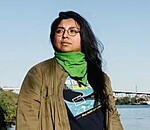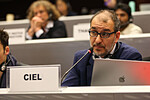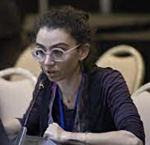(con interpretación en español, vea abajo)
The process of developing a global agreement on plastics was initiated by the United Nations Environment Assembly in 2022, and negotiations are underway. The third meeting negotiating the outlines of an International Plastics Treaty will take place in Nairobi in mid-November.
Production of plastics has increased more than tenfold since 1970, faster than the growth rate of any other group of bulk materials. More than 400 million metric tons of plastic were produced in 2020, and by some estimates that number may double by 2040. The volume of current and planned plastics production poses a serious threat to public health and the environment across the globe. Many chemicals used in plastics have adverse human health effects.
In this webinar, Yvette Arellano of Fenceline Watch shared the organization’s work to protect communities in and near Houston, Texas by reducing exposure to chemicals released during the plastics production cycle. Yvette also highlighted the disproportionate harms of plastic to environmental justice communities at the fenceline of plastics production facilities, and shared reflections on what a successful plastics treaty would look like for these communities.
Sirine Rached of the Global Alliance for Incinerator Alternatives (GAIA) and David Azoulay of the Center for International Environmental Law examined how the lifecycle health impacts of plastics are addressed in the “Zero Draft” of the treaty, which will be the framework under discussion at the Nairobi meeting. They also shared perspectives on the recently released Nordic Council of Ministers report, Toward Ending Plastic Pollution in 2040.
This webinar was be moderated by Sharyle Patton, Director of the Biomonitoring Resource Center and member of the CHE Advisory Team.
Plásticos y justicia ambiental: ¿Qué sigue en cuanto al Tratado Internacional?
El proceso de creación de un acuerdo mundial sobre los plásticos fue iniciado por la Asamblea de las Naciones Unidas para el Medio Ambiente en 2022, y las negociaciones están en marcha. A mediados de noviembre tendrá lugar en Nairobi la tercera reunión en la que se negociarán las directrices para un Tratado Internacional sobre los Plásticos.
La producción de plásticos se ha multiplicado por más de diez desde 1970, más rápido que el ritmo de crecimiento de cualquier otro grupo de materiales. En 2020 se produjeron más de 400 millones de toneladas métricas de plástico y, según algunas estimaciones, esa cifra puede duplicarse para 2040. El volumen de producción de plásticos actual y previsto supone una grave amenaza para la salud pública y el medio ambiente en todo el mundo. Muchos productos químicos utilizados en los plásticos tienen efectos adversos para la salud humana.
En este seminario web, Yvette Arellano, de Fenceline Watch, compartió el trabajo de la organización para proteger a las comunidades de Houston (Texas) y sus alrededores reduciendo la exposición a las sustancias químicas liberadas durante el ciclo de producción de plásticos. Yvette también destacó los daños desproporcionados que el plástico causa a las comunidades mas afectadas por temas de justicia ambiental en los alrededores de las instalaciones de producción de plásticos, y compartirá sus reflexiones sobre lo que podría suponer para estas comunidades un tratado exitoso sobre los plásticos.
Sirine Rached, de la Alianza Global para Alternativas a la Incineración (GAIA, por sus siglas en inglés), y David Azoulay, del Centro de Derecho Ambiental Internacional, examinaron cómo se afronta el impacto del ciclo de vida de los plásticos sobre la salud en el "Borrador Cero" del tratado, que será el marco que se debatirá en la reunión de Nairobi. También compartieron perspectivas sobre el informe del Consejo Nórdico de Ministros publicado recientemente, Toward Ending Plastic Pollution in 2040 [Hacia el fin de la contaminación por plásticos en 2040].
Featured Speakers
 Yvette Arellano is the founding director of Fenceline Watch, an organization dedicated to eradicating the harms of toxic chemicals among communities living along the fenceline of the fossil fuel industry in the Houston area. Yvette is a Mexican American gulf coast organizer with over a decade of experience advocating for immigrant, reproductive, food access, and environmental justice. Throughout this work, Yvette emphasizes that access to clean water, air, land, and food is a fundamental human right best pursued through vigorous intersectional thinking and organizing. Yvette serves as a co-chair for the Backbone Campaign and is a board member for the Center for International Environmental Law, Greenlatinos, and Peak Plastic Foundation.
Yvette Arellano is the founding director of Fenceline Watch, an organization dedicated to eradicating the harms of toxic chemicals among communities living along the fenceline of the fossil fuel industry in the Houston area. Yvette is a Mexican American gulf coast organizer with over a decade of experience advocating for immigrant, reproductive, food access, and environmental justice. Throughout this work, Yvette emphasizes that access to clean water, air, land, and food is a fundamental human right best pursued through vigorous intersectional thinking and organizing. Yvette serves as a co-chair for the Backbone Campaign and is a board member for the Center for International Environmental Law, Greenlatinos, and Peak Plastic Foundation.
 David Azoulay (he/him) is the Managing Attorney of CIEL’s Geneva office, and the Director of CIEL’s Environmental Health Program. David studied public international law in France and Spain before specializing in environmental law. Working with various coalitions and networks, David has over 15 years of experience engaging in the negotiations of Environmental international legal frameworks such as the BRS conventions, United Nations Environment Assembly, Plastic Intergovernmental Negotiation Committee. David has also been working on implementing Environmental law in the EU and in various jurisdictions around the world.
David Azoulay (he/him) is the Managing Attorney of CIEL’s Geneva office, and the Director of CIEL’s Environmental Health Program. David studied public international law in France and Spain before specializing in environmental law. Working with various coalitions and networks, David has over 15 years of experience engaging in the negotiations of Environmental international legal frameworks such as the BRS conventions, United Nations Environment Assembly, Plastic Intergovernmental Negotiation Committee. David has also been working on implementing Environmental law in the EU and in various jurisdictions around the world.
 Sirine Rached is the plastics policy coordinator for GAIA. She has also worked on waste policy issues under the UN Environment Assembly and the Basel Convention, and is following the global plastics treaty negotiations closely. Sirine also has experience investigating political conflict and human rights violations in the Middle East and North Africa with the International Crisis Group and Amnesty International. She holds masters degrees from the University of Cambridge and the School of Oriental and African Studies and is based in Berkeley, California.
Sirine Rached is the plastics policy coordinator for GAIA. She has also worked on waste policy issues under the UN Environment Assembly and the Basel Convention, and is following the global plastics treaty negotiations closely. Sirine also has experience investigating political conflict and human rights violations in the Middle East and North Africa with the International Crisis Group and Amnesty International. She holds masters degrees from the University of Cambridge and the School of Oriental and African Studies and is based in Berkeley, California.
